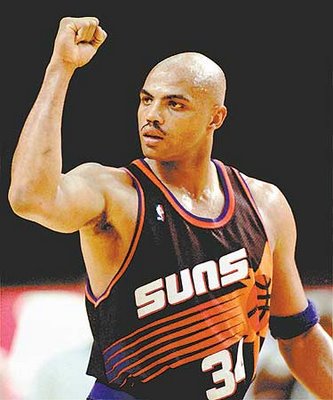
Charles Barkley, one of my favorite NBA players, has been elected to the Naismith Memorial Basketball Hall of Fame in his first year of consideration.
Barkley, of course, played for the Phoenix Suns from '92 through '96, and immediately led the Suns into the NBA Finals, where they lost to the Chicago Bulls. Those were very good years for Suns basketball, and it was a pleasure to watch Barkley play those four years. (In fact, I liked Barkley's signature move, where he backed in toward the basket, so much that I now hate the "Barkley Rule" (where the player has a 5-second time limit before he has to make an offensive move).) And then there were the numerous ... heck, daily ... stories and quotations to look forward to (if you didn't live within viewing distance of Philly, Phoenix or Houston TV stations, you don't know what you missed).
While Barkley could have handled his departure from the Suns better, I'm glad that he and Jerry Colangelo have "kissed and made up." Barkley is now only the third member of the Suns organization to have been elected to the Basketball Hall of Fame (along with Colangelo and Cornelius L. "Connie" Hawkins), and is one of 11 men in the Suns' Ring of Honor. The following is a brief biography for Sir Charles:
CHARLES BARKLEY, a native of Leeds, Alabama and attended Auburn University in Alabama, Barkley averaged 14.1 points per game and 9.6 rebounds per game in his career at Auburn. During his career with the Philadelphia 76ers (1984-1992), the Phoenix Suns (1992-1996) and the Houston Rockets (1996-2000), Barkley was selected to 11 NBA All-Star games as well as the All-NBA First Team five times and the All-NBA Second Team five times. He won an Olympic gold medal with the 1992 United States Olympic Dream Team and was the NBA’s Most Valuable Player in the 1993 season. A member of the NBA’s 50th Anniversary team, Barkley averaged 22.1 points per game and almost 12 rebounds per game in his 16-year NBA career. He shares the single game record for most offensive rebounds in one quarter (11 in 1987).
No comments:
Post a Comment